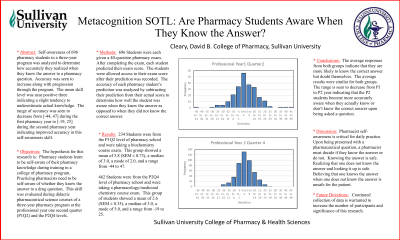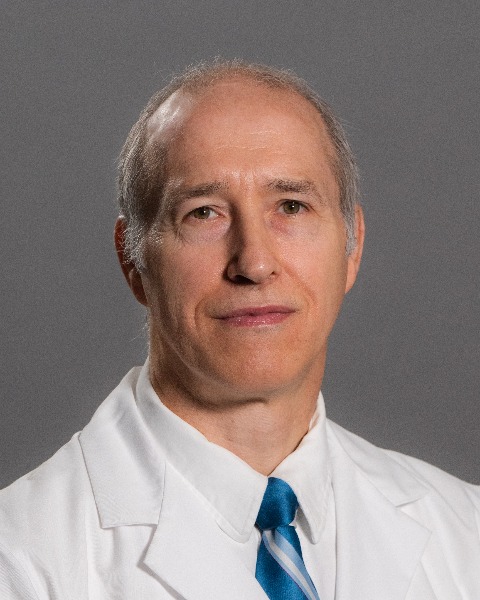Biological Sciences
(192) Metacognition SOTL: Are Pharmacy Students Aware When They Know the Answer?


David B. Cleary, PhD
Associate Professor
Sullivan University, Kentucky, United States
Primary Author(s)
Objective : Practicing pharmacists need to be self-aware of whether they know the answer to a drug question. This skill was evaluated during didactic pharmaceutical science courses of a three-year pharmacy program at the professional year one second quarter (P1Q2) and the P2Q4 levels.
Methods: 696 Students were each given a 40 question pharmacy exam. After completing the exam, each student predicted their exam score. The students were allowed access to their exam score after their prediction was recorded. The accuracy of each pharmacy student’s prediction was analyzed by subtracting their prediction from their actual score to determine how well the student was aware when they knew the answer as opposed to when they did not know the correct answer.
Results: 234 Students were from the P1Q2 level of pharmacy school and were taking a biochemistry course exam. This group of students showed a mean of 3.8 (SEM ± 0.73), a median of 3.0, a mode of 2.0, and a range from -44 to 47. 462 Students were from the P2Q4 level of pharmacy school and were taking a pharmacology/medicinal chemistry course exam. This group of students showed a mean of 2.6 (SEM ± 0.35), a median of 3.0, a mode of 5.0, and a range from -19 to 25.
Conclusions: The average responses from both groups indicate that they are more likely to know the correct answer but doubt themselves. The average results were similar for both groups. The range is seen to decrease from the P1 to the P2 year indicating that the P2 students become more accurately aware when they actually know or don’t know the correct answer upon being asked a question.
Methods: 696 Students were each given a 40 question pharmacy exam. After completing the exam, each student predicted their exam score. The students were allowed access to their exam score after their prediction was recorded. The accuracy of each pharmacy student’s prediction was analyzed by subtracting their prediction from their actual score to determine how well the student was aware when they knew the answer as opposed to when they did not know the correct answer.
Results: 234 Students were from the P1Q2 level of pharmacy school and were taking a biochemistry course exam. This group of students showed a mean of 3.8 (SEM ± 0.73), a median of 3.0, a mode of 2.0, and a range from -44 to 47. 462 Students were from the P2Q4 level of pharmacy school and were taking a pharmacology/medicinal chemistry course exam. This group of students showed a mean of 2.6 (SEM ± 0.35), a median of 3.0, a mode of 5.0, and a range from -19 to 25.
Conclusions: The average responses from both groups indicate that they are more likely to know the correct answer but doubt themselves. The average results were similar for both groups. The range is seen to decrease from the P1 to the P2 year indicating that the P2 students become more accurately aware when they actually know or don’t know the correct answer upon being asked a question.

.png)